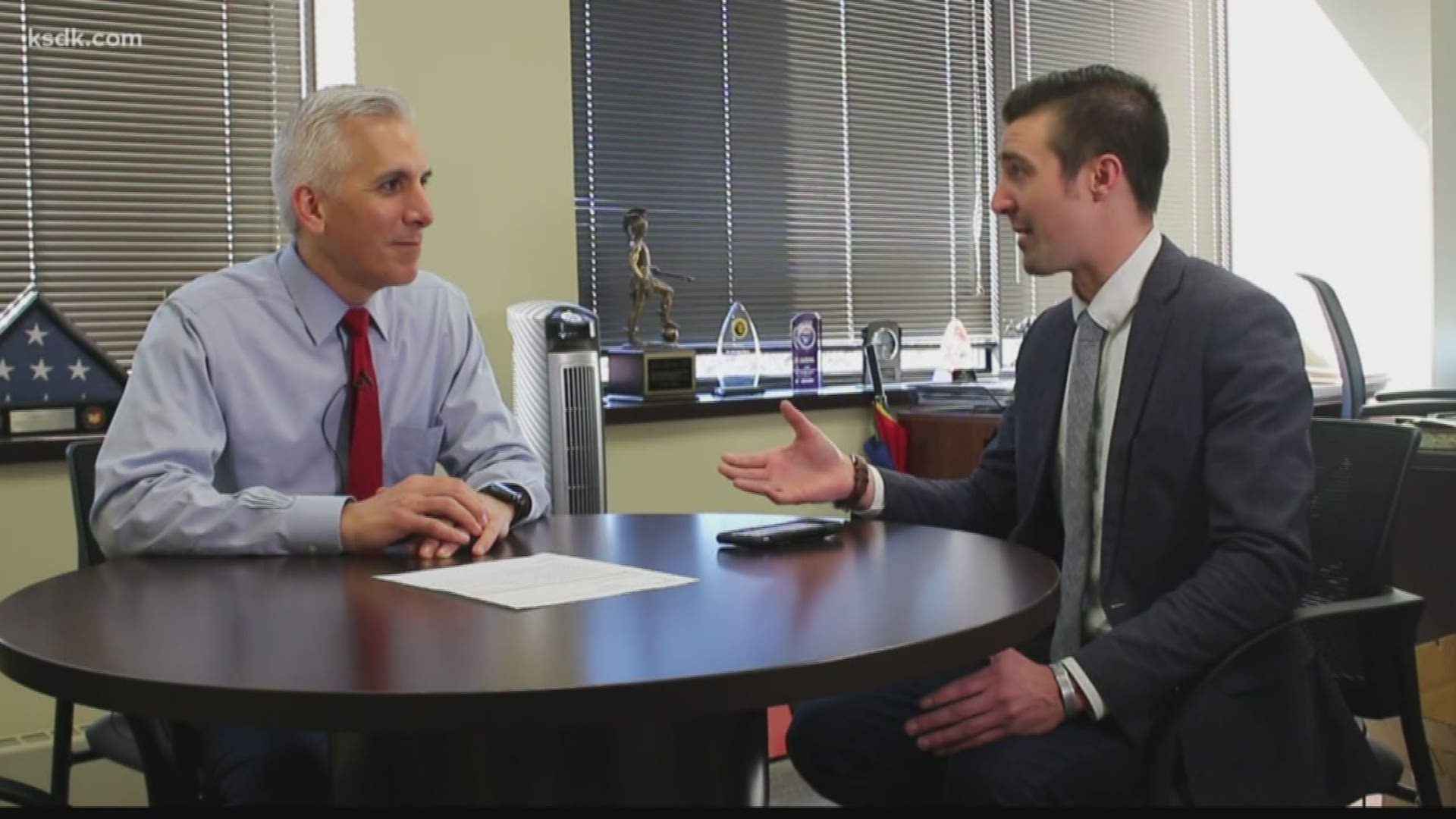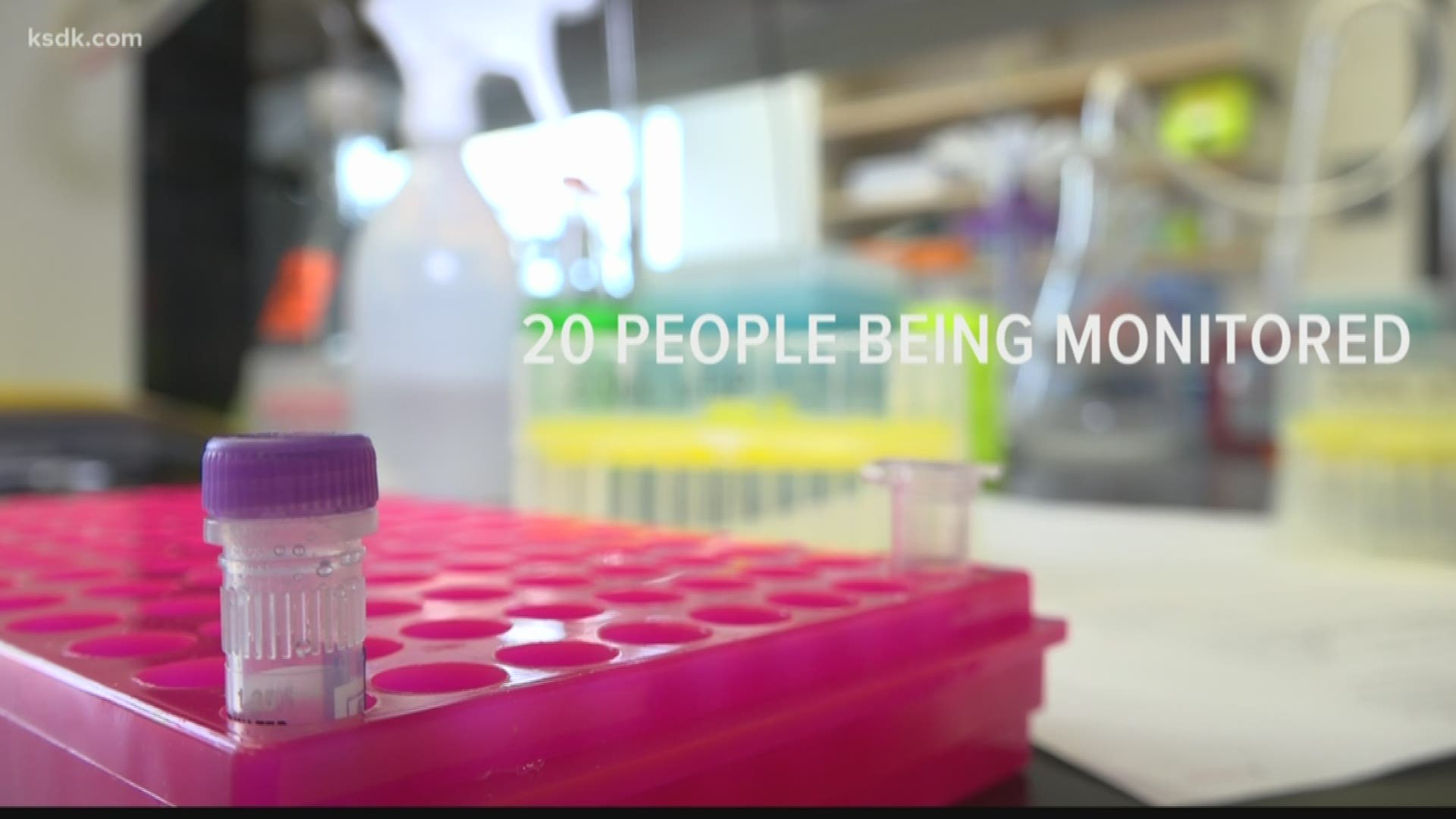ST. LOUIS — Concerns over the coronavirus, officially named COVID-19, are growing in the St. Louis area.
5 On Your Side is focusing on giving you facts and not spreading fear.
So, we took some of your questions straight to one of the most respected health officials in Missouri. Dr. Alexander Garza is SSM Health's Chief Medical Officer. He addressed some of the top local questions people have and also discussed how concerned St. Louisans should be. You can read his responses below.
5 On Your Side has gathered up the latest information you need to know about the virus in the St. Louis area in one story, which we’ll continue to update as new information comes in. Click here for the latest.
If you have questions or concerns about the coronavirus, you can text us at 314-444-5125. We will work to get answers for you.
And follow our latest coronavirus coverage at KSDK.com/coronavirus and on the 5 On Your Side app.
What should the level of concern be right now for people in Missouri and Southern Illinois?
The risk to the general public is very low, but the situation changes day by day and sort of hour by hour almost. So, it is appropriate for people to be aware that this virus is out there.
If you catch COVID-19, would you have more immunity to it after, like the flu?
Typically, if coronavirus acts like any other virus — which there is no reason to believe that it wouldn't — then your body does build up immunity to the virus.
What are the symptoms, and when should I go to the doctor?
If you are older or have chronic conditions like Emphysema or something like that, then it's more important for you to get in contact with your physician or medical care provider sooner.
How will our local health care department handle Washington University students coming back from Italy or other people coming back from highly infected areas?
Unless they're symptomatic, it's usually sort of a self-quarantine for 14 days and that's thought to be enough time to cover the incubation period if they were going to develop an illness. And then, the health department will sometimes make contact with them to do temperature checks and ask, 'How are you feeling?' things like that.
Below are more questions St. Louisans are asking. These were researched and written based on information 5 On Your Side gathered.
How long does COVID-19 survive on surfaces?
According to the CDC, it is possible to contract COVID-19 by touching a surface or object that has the virus on it, then touching one’s mouth, nose or possibly eyes. However, experts say this is not the main way the virus spreads.
CDC officials say COVID-19 generally has a poor survivability on surfaces and poses a low risk from one person to another. A study by the Journal of Hospital Infection found other strains of coronavirus have the potential to remain on metal, glass and plastic surfaces for two hours to nine days. According to the World Health Organization, the virus is unable to survive for long periods of time on packages or letters.
So, the answer here is that no one knows the exact time at this point, but “not long” is the best answer.
If there is concern that a surface is infected, clean the surface first with soap and water if dirty. Then, use household disinfectant sprays or wipes to kill the virus and protect yourself and others.
If someone comes down with the coronavirus and is strong enough to survive, how long is the duration of the illness and when is it safe to go out in public again?
If someone is diagnosed with COVID-19, the duration of the illness can vary. The CDC says patients can be discharged from healthcare facilities “whenever clinically indicated.”
What is the latest information on the mortality rate of COVID-19 and is it higher in the U.S. than other countries?
The data on mortality for SARS-COV-2 is still a moving target and varies by age group and underlying health conditions (those with lung disease, heart disease or other conditions that impair the immune system are more susceptible).
As of March 5 in the U.S., there have been 177 confirmed cases with 11 deaths (6.21%) versus 97,841 total confirmed cases in the world and 3,347 deaths (3.4%).
It should not be interpreted that the U.S. has double the mortality compared to the rest of the world. It likely means we have not identified people who are infected but with mild symptoms, who may not feel sick enough to see a doctor. In an epidemic, usually the sickest people are identified first. As we begin to test more patients in the community, we will likely see a steady decrease in the mortality rate comparable to other parts of the world.
Answer source: Washington University infectious disease physicians at Barnes-Jewish Hospital
Is the coronavirus able to spread via recirculated air, like in office buildings, hospitals, public transit vehicles and our homes?
According to researchers at Purdue University, COVID-19 could circulate inside cruise ship air conditioning systems. They say on aircraft, the coronavirus is more likely to spread by touch than through the air. And the World Health Organization says there is “very little risk” of any communicable disease being transmitted on board an aircraft.
Do I need a face mask?
Many people are wondering if they need a face mask — and are worried about price gouging.
Yes, some of these masks are going for hundreds of dollars on Amazon, and local stores are in short supply. But luckily, you really don't need a mask unless you are the one with the virus, or if you're working in the medical field.
Masks stop germs from spreading. They're not necessarily helpful in protecting yourself from the virus.
The general public is being told not to wear face masks as they won’t help keep us from getting sick, but health professionals are supposed to wear them. Why do the masks protect them but not us?
Health professionals need to wear face masks because they are in very close contact with sick patients throughout the day as part of their job. It is also recommended that those who are taking care of someone who may have COVID-19 wear a face mask when in close contact.
It is not recommended that people who are well wear a face mask as it is not the most effective way to protect yourself.
The most effective way to protect yourself and others includes frequent hand washing with alcohol-based hand rub or soap and water, covering your cough with the bend of your elbow or tissue and maintaining distance from those who are coughing or sneezing.
Answer source: Washington University infectious disease physicians at Barnes-Jewish Hospital
Are infected people recovering?
People also want to know what happens to people after they're infected with the virus. There's some good news here, according to Dr. Sean Whelan from Washington University's Department of Molecular Biology.
"People are OK after they get the virus, 98% who get tested recover and then presumably are immune for the rest of their life," Whelan said.
Is it safe to travel?
We've also received several questions about travel. You might need to change your plans, depending on where you're headed.
The Centers for Disease Control said to only travel to China and South Korea if necessary. If you're older or have a serious medical condition, avoid Japan, Iran and Italy. If you're staying in the U.S., you should be good to go.
Many airports said they're keeping a close eye on the virus, like LAX, which is sanitizing the airport every hour.
I am supposed to go to Seattle this week, is it foolish to go?
The CDC provides notices based on the risk in travelling to specific areas. It is recommended to avoid nonessential travel to destinations with warning level 3 travel notices (China, Iran, South Korea, and Italy) because of the risk of acquiring COVID-19.
People in high-risk groups, including older adults and those with chronic medical conditions, traveling to alert level 2 destinations (Japan) should talk to a healthcare provider and consider postponing their trip because COVID-19 can be more serious in these groups.
CDC does not recommend canceling/postponing travel to destinations with watch level 1 travel notices because the risk is low. A list of destinations with travel notices is available on the CDC website here.
You can consider cancelling trips if the anxiety of going would make you not enjoy your trip. If you travel, take the following precautions:
- Avoid contact with sick people
- Avoid touching your eyes, nose or mouth with unwashed hands
- Clean your hands often by washing them with soap and water for at least 20 seconds or using alcohol-based sanitizer that contains 60% alcohol
Answer source: Washington University infectious disease physicians at Barnes-Jewish Hospital
Could my online orders carry coronavirus?
People are worried about online orders from China, from sites like Amazon or Wish. But according to the Centers for Disease Control, there's little chance the virus would spread like this.
There's no evidence that coronavirus in the US is associated with imported goods. So right now, don't worry about your online shopping habits.
Are there coronavirus tests available in St. Louis? If yes, will your regular physician have access to them in their office or does a patient have to go somewhere else for testing?
The CDC has shipped the laboratory test kit for the COVID-19 (SARS-CoV-2) to approved laboratories, which includes Missouri's state public health department laboratory.Currently, this test is not available at local clinics but can be sent by a healthcare provider to the health department during a routine visit.
A healthcare provider will determine if a patient has signs, symptoms and the appropriate exposures compatible with COVID-19 and will then provide materials for testing. The decision on which patients receive testing should be based on the local epidemiology of COVID-19 as well as clinical course of illness.
Commercial labs are working to develop their own tests that will hopefully be available soon.
Answer source: Washington University infectious disease physicians at Barnes-Jewish Hospital
And according to Google Trends data, these are the top 10 things people are searching about the coronavirus:
1. What is the coronavirus?
Coronaviruses are a large family of viruses that cause illnesses ranging from the common cold to more severe diseases including Severe Acute Respiratory Syndrome (SARS) and Middle East Respiratory Syndrome, (MERS). The coronavirus that is currently spreading in many countries was first seen late December 2019. The virus has been named “SARS-CoV-2,” and the disease it causes has been named “coronavirus disease 2019”. Prior to this, the virus was called the 2019 novel coronavirus, meaning it was a new strain of coronavirus discovered in 2019.
2. How do I prepare for the coronavirus?
The CDC says there has been at least one possible case of community spread in the U.S., but it doesn't seem prevalent. As there is currently no vaccine or treatment to prevent or deal with COVID-19, the best way to protect yourself is to avoid exposure. The Centers for Disease Control recommends maintaining personal preventative actions such as:
- Avoiding close contact with those who are sick
- Not touching your eyes, mouth or nose, especially with unwashed hands
- Washing your hands often with soap and water for at least 20 seconds
- Stay home if you are sick
- Cover your coughs and sneezes with a tissue.
CDC says the risk to the general public is still low, nevertheless Dr. Nancy Messonnier, the CDC's director of the National Center for the Immunization and Respiratory Diseases said individuals and communities should begin preparing for a potential outbreak in the U.S. by implementing "non-pharmaceutical intervention methods."
Parents should inquire with local schools about outbreak plans, including whether or not schools will close and if there will be remote schooling options. Parents should also plan to have childcare options available in case schools do close.
Businesses should avoid in-person meetings and replace them with teleconferences. Employees should inquire about options to work remotely when possible.
Communities can also modify, postpone of cancel large gatherings to limit risk of exposure.
3. How many people have died from the coronavirus?
Globally, COVID-19 has affected more than 83,000 people and killed more than 3,000. You can see updated numbers from the CDC here.
4. How many cases of the coronavirus are in the U.S?
As of March 3, there are more than 100 cases of persons infected with the virus in the U.S. Of those infected, 48 of then involve people repatriated to the U.S. from Wuhan, China or from the Diamond Princess Cruise Ship that was quarantined in Japan.
There are 60 total cases of infection detected in the U.S. through public health surveillance systems. Twenty-two of these 60 cases are travel-related, and 11 are believed to be through person-to-person spread. The sources of 27 infections are still under investigation.
Cases have been reported in at least 12 states.
The CDC provides updated numbers on U.S. cases of the virus on its website.
This was also the seventh most searched question about the coronavirus.
5. How did the coronavirus get started?
COVID-19 was first detected in the city of Wuhan, China in Hubei Province. Initial infections were linked to a wet market in Wuhan that sold both live and dead animals. The World Health Organization states that coronaviruses are zoonotic, which means they are transmitted from animals to people. It is likely that the virus was transmitted from an animal at the market to humans, but a specific source has not been identified.
Since then, the virus has spread person-to-person.
6. How is the coronavirus spread?
SARS-CoV-2 and COVID-19 is spread from person-to-person, mainly between people who are in close contact (within 6 feet) with each other. It is spread via respiratory droplets produced when an infected person coughs or sneezes. The droplets land on the noses and mouths of over people, who then inhale them.
The CDC says it may be possible for the virus to spread by touching a surface or object with the virus, but this is not thought to be the main method of spread. As the virus was only discovered a few months ago, more research is needed to further determine the spread pattern of the virus.
8. What are the symptoms of the coronavirus?
According to the CDC, patients with COVID-19 have mild to severe respiratory symptoms, including fever, cough and shortness of breath. Patients with severe complications could develop pneumonia in both lungs.
9. Where did the coronavirus originate?
COVID-19 is believed to have originated from an animal, as coronaviruses are zoonotic, which means they are transmitted from animal to human. Health officials have not yet determined the specific species that originated the virus.
10. Is the coronavirus worse than the flu?
The answer to this one isn't totally known yet. Since COVID-19 was discovered recently and has been spreading for just a few months, health officials are still doing research to determine important facts like how contagious it is, how fatal it is, how long it will last, etc.. There are too many unknowns to definitely say which one is worse.
Here's what we can compare:
The seasonal flu, which includes influenza A and influenza B viruses, and COVID-19 are both contagious viruses that cause respiratory distress. The viruses share some symptoms: fever, cough and shortness of breath. Flu symptoms also includes muscle or body aches, headaches, fatigue, and vomiting and diarrhea.
While there is a vaccine for the flu, there's not currently a vaccine for the new coronavirus.
The flu is also one of the viruses that spreads more during cold weather months, so flu season tends to ease up when it gets warmer. It's too soon to know if weather or temperature impact the spread of COVID-19 or whether it will be a seasonal occurrence, according to the CDC.




